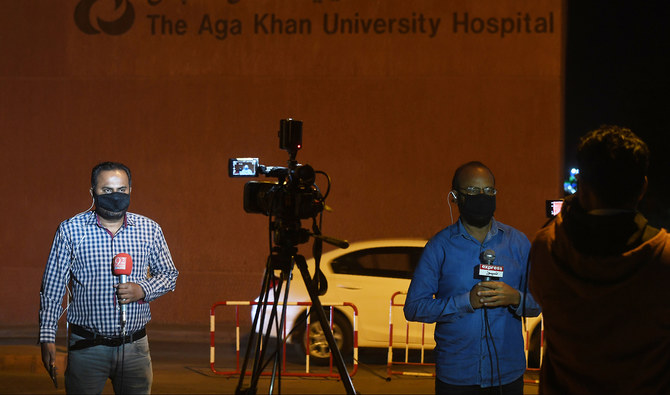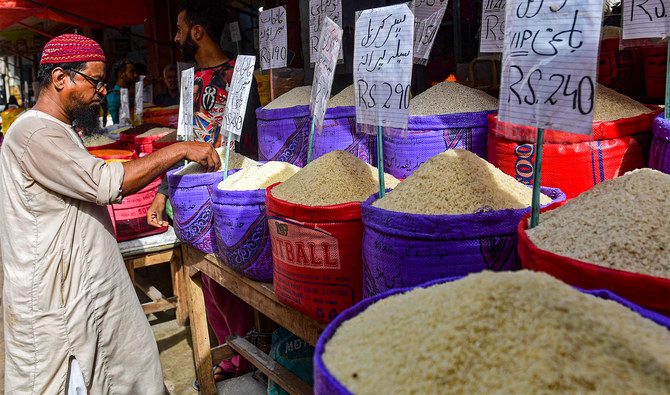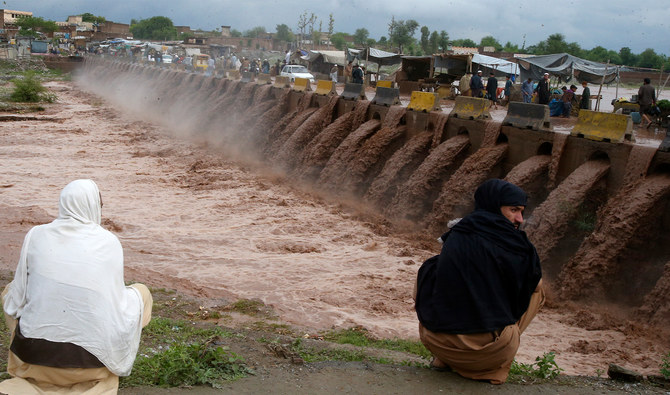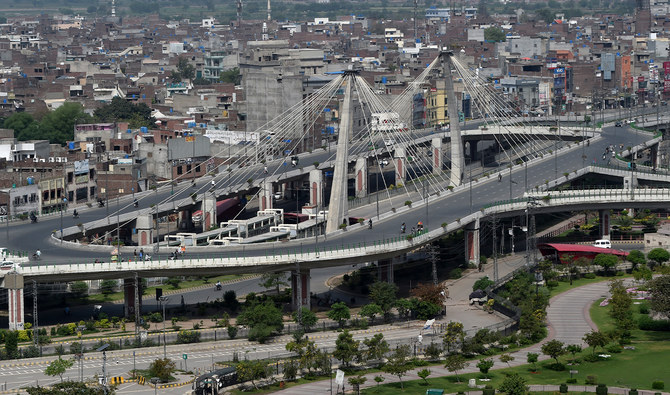ISLAMABAD: Pakistan’s minister for interior, Ijaz Ahmad Shah, on Thursday directed authorities to take “strict and immediate” action against those involved in spreading coronavirus misinformation, a week after the government announced plans to introduce new laws to curb COVID-19 “fake news” on social media.
Last week, the National Command and Operation Center (NCOC), a top federal body set up to oversee the government’s coronavirus mitigation efforts, set up a committee under the chairmanship of the interior minister to prepare a legal framework to help the government deal with coronavirus-related “fake news” on social media platforms.
“The Federal Minister for Interior, Ijaz Ahmad Shah directed the Director Cyber Wing, FIA to closely monitor and hold the responsible ones accountable for their actions,” the Ministry of Interior said in a statement released after Shah presided over a meeting on formulating a “COVID-19 Disinformation Prevention Mechanism.”
“He reinforced the point that strict and immediate action should be taken against these people. The Minister further said that people who are involved in such actions are not pro-country or its people.”
Shah said the primary purpose of the new committee was to ensure that “correct and credible information” was disseminated, adding that all available resources would be used to identify people who spread disinformation.
He also directed the head of Pakistan’s electronic media regulator not to allow “fake news” to run on TV channels.
Islamabad has previously struggled to regulate online content mostly by blocking or asking social media companies to remove blasphemous material and other posts that violate the country’s religious and cultural norms and laws, or hurt national security interests.
In February, the government approved, and then rolled back, new rules to regulate cyberspace after opponents said they could be used to stifle dissent. Social media companies have also largely shunned obliging to help law enforcement agencies access data and remove online content deemed unlawful.
Rights activists and free media campaigners fear the government’s new coronavirus “fake news” mechanism could be used to clamp down on freedom of speech.
“This shady mechanism is going to have serious implications for the already squeezed freedom of press and expression in Pakistan,” Haroon Baloch, researcher and program manage at Bytes for All, told Arab News.
Baloch said disinformation on social media was a challenge but not a crime, unless it turned into “deep-fake” news that harmed individuals and groups.
“The government must ensure transparency in the so-called mechanism,” he said, “along with ensuring an oversight of civil society and free speech campaigners to prevent abuse.”
Pakistan interior minister orders ‘strict’ action against spread of COVID-19 'fake news'
https://arab.news/bvtrg
Pakistan interior minister orders ‘strict’ action against spread of COVID-19 'fake news'

- Says all available resources would be used to identify people who spread misinformation
- Rights activists fear new laws to curb coronavirus fake news could be used to clamp down on freedom of speech
Saudi Arabia agrees to take rice imports from Pakistan to 20 percent — Pakistani trade official

- Riyadh currently imports 7 percent of its rice requirements from Pakistan, Trade Development Authority of Pakistan chief says
- The Kingdom wants to help Pakistan economically by increasing imports from South Asian country, Zubair Motiwala adds
KARACHI: Saudi Arabia has agreed to increase rice imports from Pakistan to 20 percent of the Kingdom’s total requirement, a Pakistani official said on Wednesday, as the South Asian nation gears up to achieve the $3 billion rice exports for the first time ever.
Pakistan and Saudi Arabia have been closely working to increase their bilateral trade and investment, including a recent commitment to invest about $5 billion in Pakistan.
The Kingdom wants to help Islamabad by importing more from Pakistan, according to Muhammad Zubair Motiwala, head of the Trade Development Authority of Pakistan (TDAP), the government arm that facilitates and promotes Pakistan’s international trade.
“Saudi are very eager to come and invest in Pakistan. They also want to help Pakistan by importing more from Pakistan,” Motiwala told Arab News, on the sidelines of an event hosted by the Rice Exporters Association of Pakistan (REAP) in Karachi.
“For instance, the rice, which we are exporting to Saudi Arabia, is 7 percent of the requirement and they have agreed that they will take it to 20 percent. It’s almost three times [of] what we’re exporting today.”
Pakistan has exported rice worth $2.9 billion from July 2023 till March 2024, according to REAP officials.
“We will cross the $3 billion export mark easily during the remaining four months of the current fiscal year,” Chela Ram Kewlani, the REAP chairman, said at the event.
The development came days after the Saudi foreign minister, Prince Faisal bin Farhan, visited Pakistan to enhance bilateral economic cooperation and push forward previously agreed investment deals.
His trip came a little over a week after Crown Prince Mohammed bin Salman met Prime Minister Shehbaz Sharif in Makkah and reaffirmed the Kingdom’s commitment to expedite investments worth $5 billion.
The TDAP chief said a high-powered Saudi delegation was due in Pakistan, which would further boost the trade and investment climate.
“They’re interested in so many privatization projects, like the PIA (Pakistan International Airlines) and the [Pakistan] Steel Mills, and so many others,” he said.
“And they also want to get into the stock exchange and they want to invest directly in the private sector and private-sector ventures.”
Motiwala was confident that Pakistan’s overall exports to Saudi Arabia would increase after diplomatic engagements between both countries at the time of the Saudi delegation’s visit. He, however, did not specify a tentative date for the visit.
Pakistan has exported goods worth $20.35 billion, including a major chunk of $11.14 billion that came from the textile exports, during the current fiscal year (July 2023-Feb 2024), according to official data.
However, the TDAP chief said the country was not fully harnessing its potential, which he believed to be more than $100 billion.
“I am never satisfied, to be very frank and blunt… looking at the potential of Pakistan, we should not be at this place where we are... $30 billion, $32 billion [exports] is not the size of Pakistan,” he said.
“I think at least Pakistan should export more than 100 billion dollars.”
Motiwala said the TDAP was working hard to see how the country could increase its exports.
“We are looking for the government’s help also, government’s cooperation also, where we can reduce the cost of doing business and cost of manufacturing in Pakistan,” he said. “If we are able to do that, I think sky is the limit.”
The TDAP official said Pakistan was also going to organize a single country exhibition in Riyadh within the next two months to display a wide range of ‘Made-in Pakistan’ products.
X working with Pakistan to ‘understand concerns’ over ban

- X has been rarely accessible since Feb. 17, when jailed ex-PM Khan’s party called for protests over poll results
- Interior Ministry said X was blocked on security grounds, according to report submitted to Islamabad High Court
ISLAMABAD: Social media platform X said Thursday it would work with Pakistan’s government “to understand its concerns” after authorities insisted an ongoing two-month ban was based on security grounds.
The platform, formerly known as Twitter, has been rarely accessible since February 17, when jailed former prime minister Imran Khan’s party called for protests following a government official’s admission of vote manipulation in the February election.
“We continue to work with the Pakistani Government to understand their concerns,” X’s Global Government Affairs team posted, in their first comments since the site was disrupted.
The Interior Ministry on Wednesday said X was blocked on security grounds, according to a report submitted to the Islamabad High Court where one of several challenges to the ban is being heard.
On the same day, the Sindh High Court ordered the government to restore access to social media platform X within a week.
“The Sindh High Court has given the government one week to withdraw the letter, failing which, on the next date, they will pass appropriate orders,” Moiz Jaaferi, a lawyer challenging the ban, told AFP.
The court’s full decision is expected to be published this week.
Both the government and the Pakistan Telecommunication Authority (PTA) had for weeks refused to comment on the outages.
“It is the sole prerogative and domain of the federal government to decide what falls within the preview of terms of ‘defense’ or ‘security’ of Pakistan and what steps are necessary to be taken to safeguard National Security,” said the interior ministry’s report, submitted by senior official Khurram Agha.
The interior ministry suggested intelligence agencies were behind the order.
The closure of a social media service “when there is request from any security or intelligence agency” is “well within the scope of provisions of the PTA act,” the report said.
Digital rights activists, however, said it was designed to quash dissent after February 8 polls that were fraught with claims of rigging.
Access to X has been sporadic, occasionally available for short cycles based on the Internet service provider, forcing users to use virtual private networks.
Mobile services were cut across Pakistan on election day, with the interior ministry also citing security reasons.
It was followed by a long delay in issuing voting results, giving rise to allegations of tampering.
Khan’s opposition party had already faced heavy censorship in the weeks before the election, banned from television channels and from holding rallies, forcing its campaign online.
Despite the crackdown, his party won the most seats but was kept from power by a coalition of rival parties that had the backing of the military.
As crime rates soar in Karachi, tea cafe deploys unlikely guards: stray dogs

- Cafe owner says dogs raise alarm whenever something out of the ordinary is about to happen, alerting security guard
- Customers say they have bonded over time with the dogs at Chai Master and find it comforting to be around animals
KARACHI: At a popular tea cafe in Karachi, customers sip piping hot cups of tea and chat with friends. An armed guard keeps watch for something suspicious, and with him, seven unlikely helpers: stray dogs adopted by the cafe owner.
This is the scene at Karachi’s popular tea cafe Chai Master, located in the city’s Defense Housing Authority neighborhood in a vacant plot. Pakistan’s financial hub has seen a surge in street crimes, with the Citizen Police Liaison Committee (CPLC) reporting 6,102 cases of mobile snatching from January to March 2024. Sixty persons who resisted street muggings were shot dead this year, according to police data.
The surge in street crimes in the metropolis has forced restaurants and tea cafes to hire armed guards for protection. Haris Ibrahim, Chai Master’s 33-year-old owner, did the same but found security guards were not enough for the job.
But an incident three years ago opened his eyes to a unique, yet more effective solution: stray dogs.
In 2021, a drug addict entered Chai Master premises and started harassing Ibrahim’s customers. While his security guard proved ineffective, a stray escorted the addict out of the place, much to everyone’s relief.
“I was like, wow, this is amazing. This is brilliant,” Ibrahim told Arab News. “This is better than having an armed, like gunmen, so then I was like, ‘Okay, you know what, I’m doubling down on the dogs’.”
Now, Chai Master has seven stray dogs: Tails, Spot, Speedy, Snoopy, Dozzer, Minnie, and Buddy. Ibrahim, an animal lover, has deployed all seven at the tea cafe as a security measure for his customers.
“I slowly started constructing this pack,” he explained, adding that all the dogs are neutered, spayed, vaccinated, and properly trained to perform their duties of keeping customers safe from muggers.
To train these strays, Ibrahim began with feeding them to build a bond.
“Once a bond was developed, I used the carrot and the stick method. Meaning I would reward for behavior I encourage. For that I would have dog treats lying around,” he said.
“Penalizing for undesired behavior, for which they would get a slap from me.”
For the dogs, Ibrahim said, the undesirable behavior meant barking at customers or fighting with each other.
But how do they keep the customers safe?
“Anybody who they think is catchy or could be a problem, they bark and it alerts us,” Ibrahim said. “It alerts my guard. It’s brilliant.”
Ibrahim likes to keep the dogs in their natural habitat, the streets, after he closes up. When Chai Master opens during the evenings, the strays return.
The customers are fond of the dogs too. Zahra Tafseer, an IT professional who refers to herself as a ‘cat person,’ has bonded over time with the dogs at Chai Master.
“Thanks to this place, and the dogs over here, I have sort of started to bond with dogs as well,” she told Arab News. “I’ve never found them to be scary.”
Mossa Khan, a 30-year-old who works at an advertisement agency, says he finds it comforting to be around animals at the cafe.
“So that’s the miraculous thing about animals, they can sense danger,” he said. “So, if there’s someone who’s out of place, somehow, they have a sixth sense, they know that something is off and they should be alerted.”
Ibrahim agreed, recounting an incident when the stray dogs raised alarm when a man tried to steal a side mirror from a car.
“The dogs are definitely to make this place safer for customers to feel safer,” he said.
Tafseer said the dogs were a “success story” of what one can achieve with a little bit of love.
“These dogs are the prime example of a success story, basically, of what can be achieved when you give the love and care to this species, because they’re a living thing,” she said.
Ibrahim says customers who throw stones at the dogs or act violently toward them are not welcome at his cafe.
“If you cannot respect another living creature, we do not want you as a customer,” he said.
33 killed, 46 injured in recent torrential rains in northwest Pakistan

- Pakistan has received heavy rains in last three weeks that have triggered landslides, flash floods in several areas
- Authorities have warned of another spell of heavy rains in the Khyber Pakhtunkhwa province from April 17 till April 21
ISLAMABAD: At least 33 people have been killed and another 46 injured in various rain-related incidents in Pakistan’s northwestern Khyber Pakhtunkhwa (KP) province in the last six days, the Provincial Disaster Management Authority (PDMA) said on Thursday.
The rains that began last Friday have completely destroyed 336 houses and partially damaged another 1,606 in different districts across the province, according to the PDMA.
The incidents occurred in Khyber, Upper and Lower Dir, Upper and Lower Chitral, Swat, Bajaur, Shangla, Karak, Tank, Mardan, Peshawar, Charsadda, Hangu, Battagram, Dera Ismail Khan and other districts.
“The deceased include 17 children, eight men, eight women, while the injured included 32 men, six women and eight children,” the PDMA said in its daily situation report on Thursday.
On Wednesday, the authority warned of another spell of heavy rains in the province from April 17 till April 21, which could trigger landslides and flash floods.
“The district administrations should take proactive and immediate measures before the second spell of the rains begins … and ensure the availability of small and large machinery,” it added.
The PDMA said it had issued Rs50 million to the administration of 12 affected districts for financial assistance to families of those who lost their lives in the recent rains.
“Rs80.1 million have been released by the PDMA since March 29 to the administration of various districts to deal with the emergency situation,” the authority added.
Pakistan has received heavy rains in the last three weeks that have triggered landslides and flash floods in several parts of the South Asian country.
The eastern province of Punjab has reported 21 lighting- and roof collapse-related deaths, while Balochistan, in the country’s southwest, reported 10 deaths as authorities declared a state of emergency following flash floods.
In 2022, downpours swelled rivers and at one point flooded a third of Pakistan, killing 1,739 people. The floods also caused $30 billion in damages, from which Pakistan is still trying to rebuild. Balochistan saw rainfall at 590 percent above average that year, while Karachi saw 726 percent more rainfall than usual.
Pakistan’s Lahore hosts 24th edition of Asian Forum’s tech innovation event

- The three-day exhibition is set to fetch nearly $500 million investment from a dozen countries
- These companies participating in the expo include Microsoft, Inbox, Lenovo, HP, NetSol and Dell
ISLAMABAD: Pakistan’s eastern city of Lahore is set to host the 24th edition of Asian Forum’s Information Technology Commerce Network (ITCN) today, on Thursday, Pakistani state media reported.
State Minister for Information Technology Shaza Fatima will be the chief guest, while Digital Cooperation Organization (DCO) Secretary-General Deemah Al-Yahya will be guest of honor on the opening day of summit at Lahore’s Expo Center.
The main sessions include Artificial Intelligence Summit, Global Security Symposium, Gaming and Scholars Roundtable, Investor Summit, Freelancer Summit, Made in Pakistan Roundtable Conference, the state-run Radio Pakistan broadcaster reported.
“In this edition, a delegation of international investors belonging to twelve counties will participate along with an investment of five hundred million dollars,” the report read.
“Over seven hundred stalls will be established and renowned international and national technology companies will participate in this event.”
These companies include Microsoft, Inbox, Red Hat, TP-Link, Lenovo, HP, NetSol, Abacus and Dell, according to the report.
The event is being jointly supported by the Pakistani Ministry of Information Technology and Telecommunication, Pakistan Telecommunication Authority, Special Investment Facilitation Council (SIFC), Pakistan Software Export Board and Pakistan Software Houses Association.










